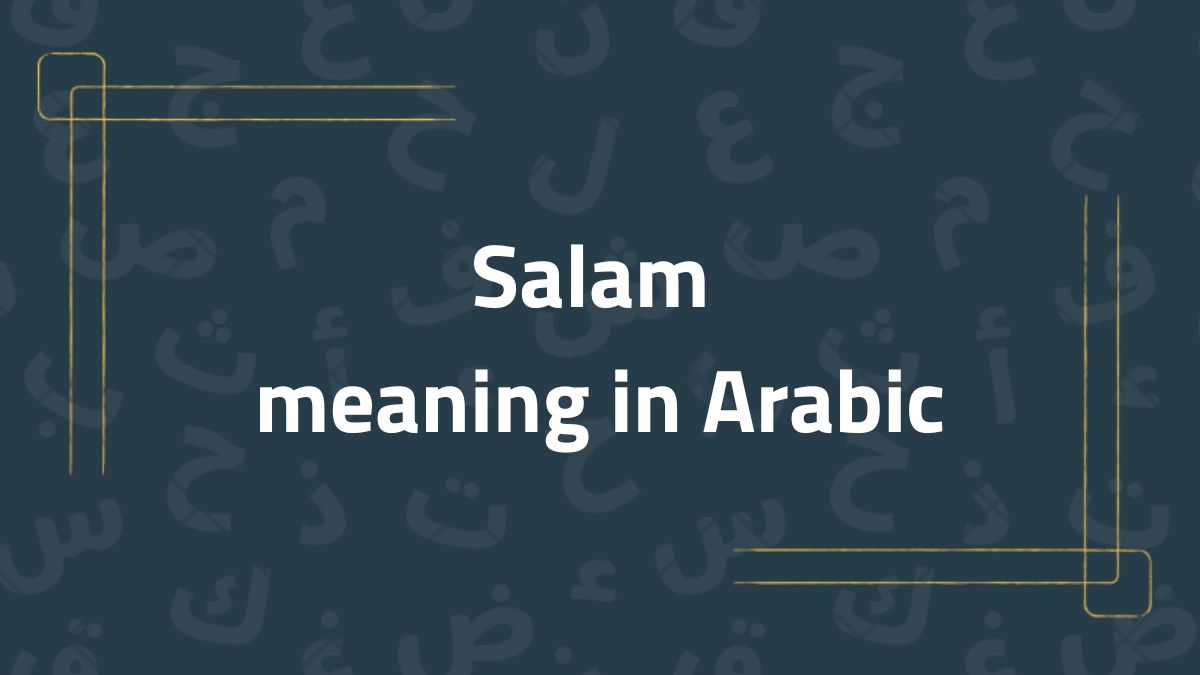The Word "Salam" Meaning in Arabic With Examples

The Arabic word “Salam” (سلام) holds deep meaning in both language and culture. It translates to “peace” in English and is widely used in greetings, religious contexts, and daily conversations.
This article explains the meaning, pronunciation, linguistic roots, and cultural significance of “Salam,” along with examples and common mistakes learners make.
The Meaning of “Salam” in Arabic
“Salam” (سلام) means “peace,” “safety,” or “well-being.” It is pronounced as “sa-laam” with emphasis on the second syllable. The word is commonly used in the Islamic greeting “As-Salamu Alaykum” (السلام عليكم), meaning “Peace be upon you.”
Linguistic Root and Grammatical Usage
The word “Salam” comes from the Arabic root letters S-L-M (س-ل-م), which relate to peace, submission, and safety. This root also forms other important words, such as:
-
“Islam” (إسلام) – Submission to God
-
“Muslim” (مسلم) – One who submits to God
-
“Tasleem” (تسليم) – Surrender or acceptance
Grammatically, “Salam” is a noun and can be used in different forms, such as:
-
“Alsalam” (السلام) – The peace
-
“Salamun” (سلامٌ) – Peace (indefinite form)
Examples of “Salam” in Arabic Sentences
-
السلام عليكم ورحمة الله
“As-Salamu Alaykum wa Rahmatullah”
“Peace and mercy of God be upon you.” (Common Islamic greeting) -
نتمنى السلام للعالم
“Natmna Alsalam lil’alam”
“We wish peace for the world.” -
هذا البيت مليء بالسلام
“Hatha albayt malee’ bialsalam”
“This house is full of peace.”
Cultural or Quranic Significance of “Salam”
“Salam” appears frequently in the Quran, emphasizing peace as a divine blessing. Key references include:
-
Quran 6:54: “When those who believe in Our verses come to you, say, ‘Peace be upon you.’”
-
Quran 10:10: “Their greeting therein will be, ‘Peace!’”
In Islamic tradition, “Salam” is not just a greeting but a prayer for safety and harmony. It is encouraged to spread peace among people.
Common Misunderstandings or Mistakes
-
Confusing “Salam” with “Islam” – While both share the same root, “Salam” means peace, and “Islam” refers to submission to God.
-
Mispronunciation – Some learners say “Salem” (سالم), which means “safe” or “healthy,” instead of “Salam.”
-
Using “Salam” alone – While “Salam” can mean peace, the full greeting is “As-Salamu Alaykum.”
Why You Should Learn “Salam”
Understanding “Salam” helps in:
-
Daily conversations – It is a key Arabic greeting.
-
Quranic studies – Many verses mention peace.
-
Cultural awareness – It reflects Islamic values of harmony.
Conclusion
The word “Salam” carries deep meaning in Arabic, representing peace, safety, and divine blessings. It is essential for greetings, religious contexts, and fostering goodwill. Learning “Salam” enhances communication and connects you to Arabic culture and Islamic teachings. Whether used in daily life or Quranic study, this word remains a cornerstone of the Arabic language.
Discover the Quran and Arabic with Shaykhi Academy
We highly recommend Shaykhi Academy for anyone seeking to learn the Quran and Arabic with excellence. The academy is known for combining expert teaching with a compassionate approach, making it a top choice for students worldwide who want to connect deeply with the words of Allah.
At Shaykhi Academy, you’ll find highly qualified teachers who specialize in guiding learners of all ages and levels. Whether you’re just beginning your journey with Arabic letters or aiming to master Tajweed and Quran recitation, their personalized lessons ensure steady progress at your own pace.
With engaging classes, flexible scheduling, and a focus on both spiritual and linguistic growth, Shaykhi Academy makes learning both enjoyable and impactful.
Watch a sample class below to see Shaykhi Academy in action:
Learn Arabic, Quran, And Tajweed With Free Trial!
Make your home a place of faith, understanding, and connection with the Quran. Whether you're starting from scratch or deepening your knowledge, Shaykhi Academy is here to guide you — step by step. ✅ Tailored for all ages ✅ Clear, structured learning ✅ Flexible online sessions ✅ Book your free trial session now!
Learn More
